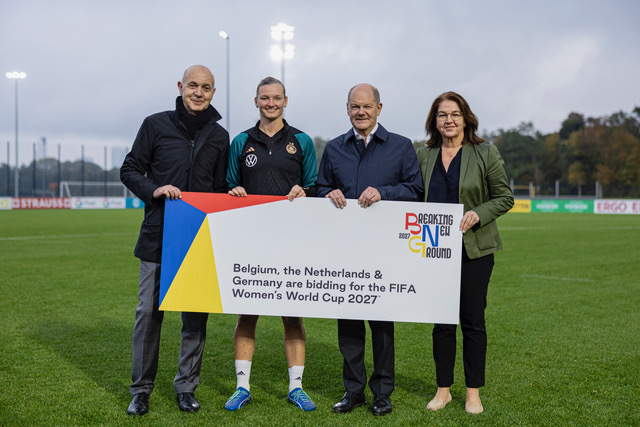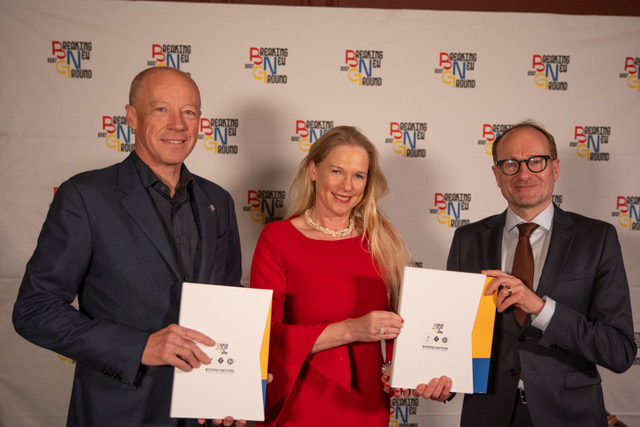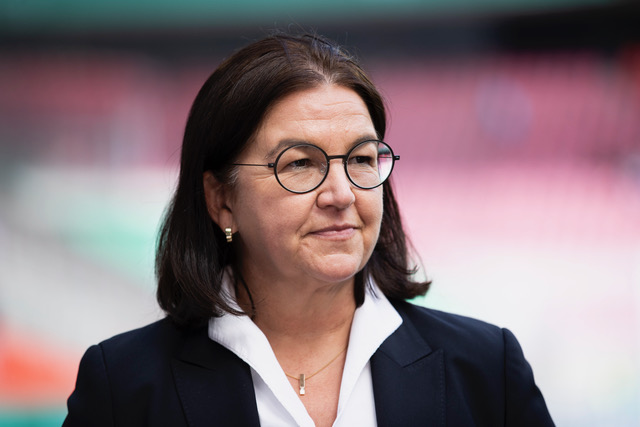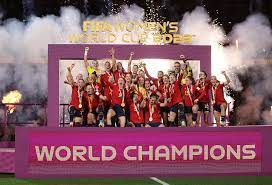Belgium, The Netherlands and Germany have combined for a Women’s World Cup 2027 bid that they promise will set the standard for years ahead and provide pathways for women in the game and society. Insideworldfootball talks exclusively to DFB general secretary Heike Ullrich and Royal Belgian Football Association president Pascale Van Damme.
Q. What do you see as the most important impact your joint hosting of 2027 will have on world football?
Heike Ullrich: Our priority is to showcase women’s football in a manner that attracts millions of new players and fans aligning with the ambitious Vision FIFA has set for the women’s game in the years ahead. We believe our bid, if successful, has all the attributes to shine a powerful light on the quality of the women’s game and encourage girls around the world to take up football and follow in the footsteps of their heroes performing at the highest level.
Pascale Van Damme: We also want to scale new heights in relation to the management and overall quality and level of organisation of a FIFA Women’s World Cup both in terms of sporting and non-sporting infrastructure in order to cater for the wishes, demands and expectations of both players and fans. We will ensure a safe and welcoming environment and overall quality of management needed to deliver a smooth and operational successful tournament. The aim is to set the standard for what a competition of this kind should look and feel like in the years ahead.
Heike Ullrich: Furthermore, we believe that profiling women powerfully through a BNG hosted World Cup will have a knock on and positive effect well beyond the game helping female empowerment across all pillars of society globally. That is the impact we’re seeking to have if we are afforded the honor to host the FIFA Women’s World Cup 2027.
Pascale Van Damme: And of course, showcase to the world the very best of Belgium, The Netherlands and Germany offering a welcoming environment where fans can visit our nations in a spirit of celebration and fun. We want fans to experience something unique that will remain with them forever.

Q. What is your overall objective with the World Cup? What will be your measures of success for 2027?
Heike Ullrich: Short term the objective is to ensure operational and logistical excellence ensuring a smooth and problem-free tournament. We will make sure that the world’s best players are provided with all the necessary conditions to perform optimally.
Pascale Van Damme: From a fan perspective, our objective is to provide an environment which is welcoming and safe ensuring that they are able to experience the unique atmosphere of a tournament of this magnitude. An atmosphere that is defined by friendly competitiveness where people from across the world come together in a spirit of unity, fun and celebration.
Heike Ullrich: For commercial partners we will seek to ensure that we deliver a tournament that they are proud to be associated with and which offers the return on the investment they seek. For our three nations we wish to profile ourselves as great hosts and highlight the very best that comes from our western European culture.
Pascale Van Damme: Longer term the aim must be for a BNG World Cup to act as a platform to accelerate and deepen the growth of the women’s game globally and help propel it to the next level as it seeks to unleash its full potential. By hosting a world class event with such high visibility we hope millions of girls and women will be encouraged to take up football. Outside the pitch, we also seek to entice new fans and boost the numbers who follow the game. Beyond the game itself, we aim to support female empowerment across all levels of society by showcasing the very best of female sporting endeavor.
Kudos to previous hosts of the FIFA Women’s World Cup for setting a stellar example for us to build from. The success of previous editions of the World Cup has elevated the tournament to new heights. We aim to build on the standards they have set and strive to take it to an even higher level. The bar has been set high as we seek to Break New Ground!
Q. How far can the benefit go beyond the three host nations?
Pascale Van Damme: Firstly, the World Cup will offer a platform for many countries from across the world to perform and pit themselves against one another at the highest level of the women’s game. The visibility afforded by the competition will likely see many more girls take up the game on a global level and attract many fans and commercial interest towards women’s football. The record-breaking revenue BNG will deliver will be used by FIFA to support its Vision to accelerate and deepen the development of the women’s game globally.
Ultimately our focus is to ensure football acts as a powerful driver of human development. In our role our biggest satisfaction comes from seeing a young girl or young boy with a huge smile across their face having fun, being happy and taking on board crucial life skills pursuing their football passion! As football leaders we know we’re doing something right when we see that happiness and satisfaction in kids”
Heike Ullrich: Ultimately, the aim is to have a positive impact across all 211 Member Associations. A FIFA World Cup by definition is always about much more than the host nations and all about the benefits it can bring to the football family and ecosystem as a whole.
Q. Do you all have the same aspirations in terms of what you want to achieve from the hosting, or are there different priorities between countries?
Heike Ullrich: Prior to formally joining forces around this bid we conducted detailed discussions to ensure we were fully aligned around our objectives. There is simply no point in pushing forward a joint bid if we are not at one around our aspirations. We rapidly concluded that our vision and objectives were fully aligned as Pascale and I have expressed in our earlier answers and that allowed us to formalise our partnership quite swiftly.
Q. How does the relationship between the three federations work? How much co-ordination is there across your planning?
Pascale Van Damme: From the start of our journey we have forged a very collaborative and effective working environment and working practices and processes. We understood that this was vital in a project of this nature where we need to work jointly. There is no hierarchy between us. We work as one, combining forces at all levels and around all aspects of the bid. Our three federations are pooling our resources, expertise and know-how to ensure we are designing a bid that maximises output. That is where our full focus lies.
Heike Ullrich: We have a team of project leads representing all three federations who coordinate the overall bid with teams built around specific workstreams that define the bid and which helped us deliver last December what we believe was a really strong bid book. At political level the three sets of Presidents and General Secretary’s lead the way.
To-date we are delighted at how well our collaboration and daily working practices have worked. Our experience shows that in this journey we are truly greater than the sum of our parts. As Federations our relationship has grown from one of strong neighbours to one of great friends – BNG is truly one!
Pascale Van Damme: Let us add also, that we would not have been in a position to present a bid without the full support and backing of our three governments. A competition of this size and prestige can only be hosted with the complete backing of our political leaders. This is about more than the interests of football in our countries. If our bid is successful, it will have an impact on many aspects of our three countries well beyond the game. Our political leaders have backed us fully since day one, when we first begun to consider presenting a joint bid. We would not have entered this race without the full commitment of our central governments and regional and local authorities.

Sustainability is a hot issue and one you have highlighted – what are the key elements in your strategy?
Heike Ullrich: You’re absolutely correct, sustainability is a crucial element of our bid. In today’s world, it’s imperative to prioritize sustainability in projects of such prominence, visibility, and global significance. We have therefore meticulously crafted a BNG Vision with a robust sustainability angle, seeking to align with the United Nations Sustainable Development Goals (SDGs).
Pascale Van Damme: Central to our approach is the concept of diversity and inclusion. We believe that embracing diversity not only enriches the tournament experience but sits naturally with our commitment that all matches are centered within the vicinity of the borders of our three countries. By promoting inclusivity and accessibility for fans from diverse backgrounds we encourage close interaction and proximity as we seek to visibly promote the power of football in forging alliances, breaking down barriers and uniting people.
Heike Ullrich: Our “compact” competition model, with a maximum distance of 300 km between any two stadiums, minimizes carbon emissions associated with travel. This approach not only reduces the environmental impact but also emphasizes our dedication to providing a sustainable tournament experience. Leveraging our exceptional rail infrastructure, we offer high-speed, clean, and cost-efficient connectivity, further enhancing accessibility while minimizing the overall environmental footprint.
Moreover, well-developed public transport links within host cities facilitate efficient movement for fans, promoting sustainable urban mobility. Throughout the competition, we will also actively encourage fans to adopt behaviors that promote sustainability, reinforcing our collective responsibility towards environmental stewardship.
Pascale Van Damme: In essence, our bid not only aims to deliver a world-class sporting spectacle but also seeks to advance the principles of diversity, inclusion, and sustainability, in line with the UN SDGs. Together, we strive to Break New Ground and set a benchmark for future tournaments when it comes to sustainability and inclusivity.
And of course, our focus is of course around the long-term sustainable future of football itself which is why we’re so focused in ensuring a successful BNG bid will act as a catalyst in accelerating and deepening the women’s football globally and handing over a vibrant game to future generations of players and fans.
Q. How is your lobbying of federations going? Are you getting support? Are voting nations hearing your pitch?
Pascale Van Damme: We don’t engage in lobbying in the narrow sense most would define that term. We prefer to describe our interaction with Member Associations as “engagement”. In any bidding process of this nature where a decision is made through a vote by an “electorate” it is absolutely normal that engagement takes place.
FIFA has set clear guidelines and structures around what this engagement should look like and BNG has been in regular contact with the global governing body to ensure it aligns with these guidelines at all times.
The nature of our engagement has been principally focused in trying to have Member Associations understand that as hosts we are essentially providing a service to football and FIFA’s efforts around its development. In that sense we have wanted to feel inclusive and present BNG as something that “belongs” to more than our three countries but rather to all 211 Member Associations.
Heike Ullrich: Over recent months BNG representatives have been present at FIFA and Confederation tournaments across the world which has allowed us to share details of the BNG Vision and listen to the aspirations of Member Associations around the FIFA Women’s World Cup 2027 and the support and boost it can provide in their efforts in developing the game domestically.
Back in February, we held events in both Doha and Abidjan around the finals of the AFC Asian Cup and the African Cup of Nations with the leadership of Member Associations from across Asia and Africa to outline the BNG Vision and share with them our aims, objectives and aspirations for the bid.
The level of interest and respect we received was highly appreciated. It’s clear that football leaders from across the world are very focused and understand that we’re at a pivotal and exciting time in the journey around the development of the women’s game. They appreciate that the FIFA Women’s World Cup 2027ä will play an important role in this development and as such they showed interest in BNG to see what we can bring in impacting this development.

Q. What are your expectations around the commercial angle of the bid?
Pascale Van Damme: Again here, aligning with our Breaking New Ground motto, we have ambitions targets based around clear market research that we undertook. We are confident that we will generate record-breaking revenue that will surpass any levels seen in any previous edition of a FIFA Women’s World Cup. Our projections would see us raise revenue by significant levels in comparison to the FIFA Women’s World Cup 2023 building on the great success and platform provided by Australia and New Zealand.
Heike Ullrich: We foresee strong revenue generation across all the traditional commercial streams including through the sale of broadcasting rights, sponsorship and ticketing. But that in itself is not an end. The key is what we do with this record-breaking revenue.
Here, we are very clear. Our plan is to ensure that it will be channeled through FIFA back to Member Associations as a means to reinvest around the development of the women’s game domestically. In years to come we hope that Member Associations from across the world will look back on a successful BNG bid for the FIFA Women’s World Cup 2027ä as a crucial moment in supporting their efforts around the development of the women’s game in their domestic markets. Revenue generation and distribution will be key to that.
Contact the writer of this story at moc.l1722029860labto1722029860ofdlr1722029860owedi1722029860sni@n1722029860osloh1722029860cin.l1722029860uap1722029860


